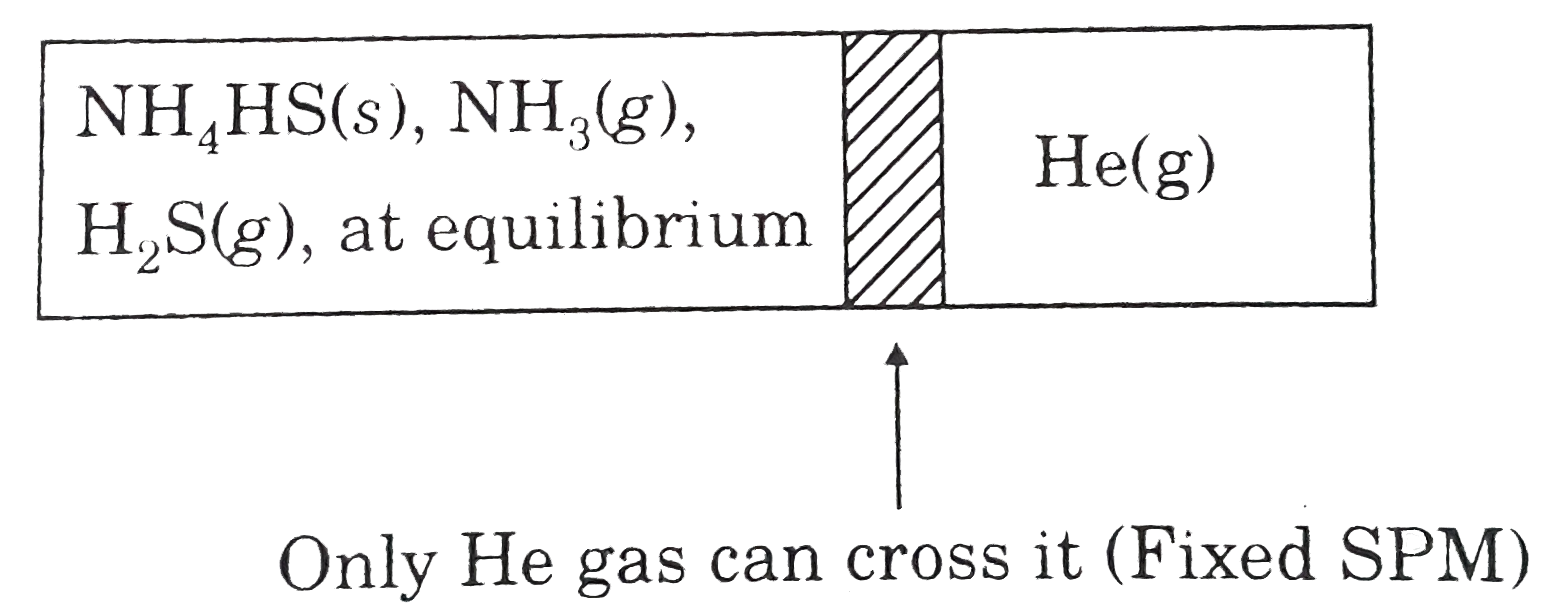The dissociation of solid NH4HS in a closed container produces a pressure of 1.12 atm at 105∘C. Calculate Kp for the equilibrium. NH4HS(s)⇔NH3(g)+H2S(g)
To calculate Kp for the equilibrium of the dissociation of solid NH4HS, we can follow these steps:
Step 1: Write the balanced equation for the dissociation
The dissociation of solid ammonium hydrogen sulfide can be represented as:
NH4HS(s)⇌NH3(g)+H2S(g)
Step 2: Understand the conditions of the problem
We are given that the pressure in the closed container at equilibrium is 1.12 atm at a temperature of 105∘C.
Step 3: Determine the change in moles
Initially, we have 1 mole of NH4HS (solid), which does not contribute to the pressure. Upon dissociation, it produces 1 mole of NH3 and 1 mole of H2S. Therefore, at equilibrium, we have:
- Moles of NH3=x
- Moles of H2S=x
The total number of moles at equilibrium is:
Total moles=x+x=2x
Step 4: Relate the total pressure to the mole fraction
Since the total pressure at equilibrium is given as 1.12 atm, we can express the partial pressures of NH3 and H2S in terms of x:
PNH3=x2x⋅P=12P
PH2S=x2x⋅P=12P
where P is the total pressure (1.12 atm).
Step 5: Calculate the partial pressures
Since both gases contribute equally to the total pressure:
PNH3=PH2S=1.122=0.56 atm
Step 6: Write the expression for Kp
The equilibrium constant Kp for the reaction is given by:
Kp=PNH3⋅PH2S
Substituting the values we calculated:
Kp=(0.56 atm)⋅(0.56 atm)=0.3136 atm2
Step 7: Final answer
Thus, the value of Kp for the equilibrium is:
Kp=0.3136 atm2
---
The dissociation of solid ammonium hydrogen sulfide can be represented as:
NH4HS(s)⇌NH3(g)+H2S(g)
We are given that the pressure in the closed container at equilibrium is 1.12 atm at a temperature of 105∘C.
Initially, we have 1 mole of NH4HS (solid), which does not contribute to the pressure. Upon dissociation, it produces 1 mole of NH3 and 1 mole of H2S. Therefore, at equilibrium, we have:
- Moles of NH3=x
- Moles of H2S=x
Total moles=x+x=2x
Since the total pressure at equilibrium is given as 1.12 atm, we can express the partial pressures of NH3 and H2S in terms of x:
PNH3=x2x⋅P=12P
PH2S=x2x⋅P=12P
where P is the total pressure (1.12 atm).
Since both gases contribute equally to the total pressure:
PNH3=PH2S=1.122=0.56 atm
The equilibrium constant Kp for the reaction is given by:
Kp=PNH3⋅PH2S
Substituting the values we calculated:
Kp=(0.56 atm)⋅(0.56 atm)=0.3136 atm2
Thus, the value of Kp for the equilibrium is:
Kp=0.3136 atm2
Topper's Solved these Questions
- CHEMICAL EQUILIBRIUMBOOK - RC MUKHERJEECHAPTER - CHEMICAL EQUILIBRIUMEXERCISE - Problems
56 Videos
- CHEMICAL EQUILIBRIUMBOOK - RC MUKHERJEECHAPTER - CHEMICAL EQUILIBRIUMEXERCISE - Objective Problems
57 Videos
- ATOMIC WEIGHTBOOK - RC MUKHERJEECHAPTER - ATOMIC WEIGHTEXERCISE - PROBLEMS
6 Videos
- CHEMICAL EQUIVALENCEBOOK - RC MUKHERJEECHAPTER - CHEMICAL EQUIVALENCEEXERCISE - PROBLEMS
24 Videos
Similar Questions
Knowledge Check
The equilibrium constant Kp for the reaction NH4HS(s)⇔NH3(g)+H2S(g) is
AKP=PNH3×PH2SPNH4HSBKP=PNH4HSPNH3×PH2SCKP=PNH4HSDKP=PNH3×PH2SThe equilibrium constant for the reaction NH4HS(s)⇔NH3(g)+H2S(g) is correctly given by
A[NH3][H2S][NH4HS]B[NH4HS][NH3][H2S]C[NH3][H2S]D[NH3]+[H2S]NH4HSWhich of the following statement(s) is/are correct for the following equilibrium?
NH4HS(s)⇔NH3(g)+H2(g)AAddition of NH4HS(s) at equilibrium increases the concentration of NH3(g).BAddition of NH3(g) at equilibrium decreases the concentration of H2S(g)CKP is independent of the amount of NH4HS(s)DIncrease inn temperature change the KP of this reaction.
Some solid NH4HS is placed in flask containing 0.5 atm of NH3. What would be the pressure of NH3 and H2S when equilibrium is reached.
NH4HS(g)⇔NH3(g)+H2S(g),Kp=0.11
View SolutionSome solid NH4HS is placed in flask containing 0.5 atm of NH3. What would be the pressure of NH3 and H2S when equilibrium is reached.
NH4HS(g)⇔NH3(g)+H2S(g),Kp=0.11
View SolutionA definite amount of solid NH4HS is placed in a flask already containing ammonia gas at a certain temperature and 0.1 atm pressure. NH4HS decompses to give NH3 and H2S and at equilibrium total pressure in flask is 1.1 atm. If the equilibrium constant KP for the reaction NH4HS(s)⇔NH3(g)+H2S(g) is represented as z×10−1 then find the value of z.
View SolutionConsider the decomposition of solid NH4HS in a flask containing NH3(g) at a pressure of 2 atm. What will be the partial pressure of NH3(g)andH2S(g) after the equilibrium has been attained?
Kp for the reaction is 3.
View Solution
Information : The entire system is at eqilibrium at 300 K. The volume of each chamber is 82.1.L.
Total pressure in left chamber is 4 atm and in right chamber is 2 atm. NH3(g)andH2S(s) are obtained only form dissociation of NH4HS(s). Based on this information select the correct option : statement-1 : The KP value for the reaction:
NH4HS(s)⇔NH3(g)+H2S(g) is atm2.
statement- 2 : The parrical pressure of He gas in the left chamber is 1 atm.
View Solution
